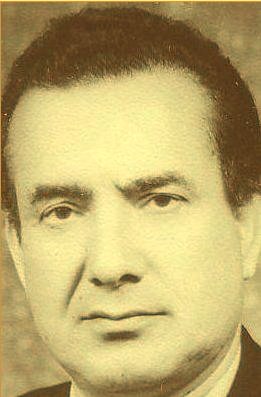Akbar Adibi facts for kids
Quick facts for kids
Akbar Adibi
|
|
|---|---|
 |
|
| Born | February 12, 1939 Songhor, Iran
|
| Died | August 26, 2000 |
| Nationality | Iranian |
| Alma mater | Tehran University University of California, Santa Barbara |
| Known for | Creating Iran's first solar cell Father of Electronics and VLSI in Iran |
| Scientific career | |
| Fields | Solid State Electronic engineering, VLSI |
| Institutions | Amirkabir University of Technology |
| Doctoral advisor | Phillip F. Ordung |
Akbar Adibi (born 1939, died 2000) was a very important Iranian engineer. He was an expert in electronics and a university professor. Many people call him the "Father of Electronics and VLSI in Iran." VLSI stands for Very Large Scale Integration. It's about making tiny electronic circuits with millions of parts.
Contents
About Akbar Adibi
Early Life and Education
Akbar Adibi was born on February 12, 1939. His hometown was Songhor in Iran. He studied Electrical Engineering at Tehran University. He earned his Master of Science degree in 1965. After that, he started teaching at Tehran Polytechnic. This university is now known as Amirkabir University of Technology.
Professor Adibi continued his studies in the United States. He went to the University of California, Santa Barbara (UCSB) in 1973. There, he earned two more Master's degrees. One was in computer systems, and the other was in solid-state devices. He finished his PhD degree in 1977. His PhD research was about Schottky Barrier Solar Cells. These are special types of Solar cells.
His Career and Achievements
Akbar Adibi began his teaching career at Tehran Polytechnic. He became an assistant professor there. He also worked as a senior researcher. This was at the Material and Energy Research Center (MERC) in Tehran.
He had many important achievements:
- In 1978, he created Iran's first Solar cell. This was a big step for technology in Iran.
- In 1984, he helped start the Graduate Studies program at Amirkabir University.
- He guided Hassan Kaatuzian, who became Iran's first PhD graduate in electronics in 1994.
- He wrote over 100 articles for scientific journals.
- In 1995, he became a Full Professor.
- He won the respected Kharazmi National Prize in 1995 for his excellent work.
- In 1996, he was named "The Most Recognized and Elite University Professor of Iran." The President of Iran gave him this award.
- He became a senior member of IEEE in 1996. IEEE is a large organization for engineers.
- He earned the special title "The Father of Electronics and VLSI in Iran." This title was given to him by other scientists and the media.
Contributions to Industry and Books
Professor Adibi was part of many important projects. He helped design a 32-channel system for sending signals. This was with the Iranian Communication Research Center. He also helped create a system to protect high-voltage power networks. Another project was a control system for a power plant.
He wrote several technical books. These include Pulse Techniques and Theory and Technology of Semiconductor Devices. He also translated a book from English to Persian.
Akbar Adibi strongly believed that electronics and VLSI technology could help Iran. He thought it could make Iran less dependent on oil. He hoped Iran could become a leader in high-tech exports. Sadly, he never got all the money needed to build Iran's first working VLSI lab.
He continued his work until his death on August 26, 2000. He passed away due to heart failure. Today, an auditorium at Amirkabir University of Technology is named after him. He is remembered by his wife, Shahla Ejtemai Adibi, and his two children, Sasan and Mahsa Adibi.
See also
- Modern Iranian scientists, scholars, and engineers
- Amirkabir University of Technology
- Tehran Polytechnic
- University of Tehran
 | Claudette Colvin |
 | Myrlie Evers-Williams |
 | Alberta Odell Jones |

